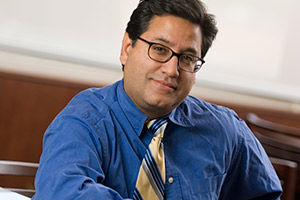Paul Cuadros speaks of his journey against Latino prejudice

Paul Cuadros, award-winning journalist and University of North Carolina associate professor, presented a speech explaining his experiences coaching a predominantly high school soccer team on Thursday.
In 1999, Cuadros traveled to Siler City, North Carolina to report on Latino poultry workers. However, what he found was entirely different from a news article.
Within Siler City there was a growing animosity e because of the growing Latino culture. This hostility was halting the young Latino boys from being able to play soccer at the local high school.
Cuadros recalls the one-on-one time he had in his boyhood playing soccer with his father and understood he had to do something.
Therefore Cuadros did what anyone who understands the feeling of marginalization. He spent the next three years of his life fighting for these boy’s dreams.
Once the Los Jets team had come to fruition at Jordan Matthews High School, Cuadros soon found himself in an unexpected role- head coach of a high school soccer team.
As said by Cuadros in the question and answer portion post screening of Los Jets, the struggle to start the team was “…not just a because of the language barrier, but was a matter of being accepted.” Panelist and past Jets team member Francisco Morales remembers “…it was the team because we were not accepted anywhere else… we were a family.”
And with their first state championship victory in 2004, Cuadros was able to tell the tremendous story of these boys through the novel A Home on the Field.
However, the story of Los Jets did not stop with a book. Years after this widely discussed book’s release, documentarian Mark Landsman approached Coach Cuadros about the possibility of a series about the current team members, and with the help of Jennifer Lopez and her channel NuvoTV this television series aired in 2014.
The series Los Jets follows the current team members, specifically the seniors on the team, as they struggle with the issues they face as the sons of immigrants or as undocumented immigrants themselves. For example, one of the seniors, Darwin Ramirez, had the grades and the athletics to get him into school, but being undocumented meant paying out-of-state tuition.
This is a common issue for undocumented children who plan to go into higher education. For most of these kids “the American dream ends at twelfth grade,” as said in the documentary series by one of the University of Chapel Hill tour guides.
When asked about the importance of documentary series such as this, Cuadros said “(the series) is great because it really delves into the lives of Latino youths and presents their lives as honestly and as openly as can be. The value of the series is that you get to hear from Latino youth in their own words and that’s something that you do not always get in the media.”
The impetus behind Los Jets ties in well with Intercultural as it “helps us understand the lives of people in other cultures,” as said by Natalie Picazo.
Picazo recalls utilizing Cuadros’ own book for many of her lectures at the Watson School of Education which facilitated courses on understanding the “diverse needs of English Language Learners in the state of North Carolina,” and how excited she was to bring such a series as Los Jets to UNCW.








